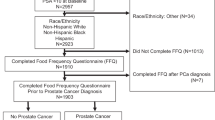Abstract
Objectives: Relationships between dietary factors and the incidence of prostate cancer have emerged from epidemiologic and laboratory studies, but there are no published data on the relationship between diet and disease progression among prostate cancer patients. We studied the association between dietary fat intake and prostate cancer survival.
Methods: We prospectively followed 384 men diagnosed with prostate cancer between 1990 and 1992 in the Quebec City area. On average 3 months following diagnosis, trained nutritionists interviewed the men on their usual diet using a diet history questionnaire. Deaths during follow-up were documented through record linkage with the provincial mortality file and review of hospital records. Cox proportional hazard models were used to estimate the relative risk of dying from prostate cancer associated with terciles of fat intake, expressed as percent of dietary energy, while controlling for prognostic factors and total energy.
Results: The median duration of follow-up was 5.2 years. During the follow-up period 32 patients died of prostate cancer and 39 died of other causes. After controlling for grade, clinical stage, initial treatment, age and total energy intake, we found that saturated fat consumption was significantly associated with disease-specific survival (two-sided p-value = 0.008). Compared to men in the lower tercile of saturated fat, those in the upper tercile had three times the risk of dying from prostatecancer (relative risk = 3.1, 95% confidence interval: 1.3–7.7).
Conclusions: Our findings suggest that saturated fat is related to disease-specific survival and that, if this relation is causal, a moderate reduction of its intake might reduce the risk of dying from prostate cancer.
Similar content being viewed by others
References
World Cancer Research Fund, American Institute for Cancer Research (1997) Food, Nutrition and the Prevention of Cancer: a global perspective. Washington, DC, pp. 310-323.
Wang Y, Corr JG, Thaler HT, Tao Y, Fair WR, Heston WDW (1995) Decreased growth of established human prostate LNCaP tumors in nude mice fed a low-fat diet. J Natl Cancer Inst 87: 1456-1462.
West DW, Slattery ML, Robison LM, French TK, Mahoney AW (1991) Adult dietary intake and prostate cancer risk in Utah: a case-control study with special emphasis on aggressive tumors. Cancer Causes Control 2: 85-94.
Giovannucci E, Rimm EB, Colditz GA, et al. (1993) A prospective study of dietary fat and risk of prostate cancer. J Natl Cancer Inst 85: 1571-1579.
Whittemore AS, Kolonel LN, Wu AH, et al. (1995) Prostate cancer in relation to diet, physical activity, and body size in Blacks, Whites, and Asians in the United States and Canada. J Natl Cancer Inst 87: 652-661.
Bairati I, Meyer F, Fradet Y, Moore L (1998) Dietary fat and advanced prostate cancer. J Urol 159: 1271-1275.
Meyer F, Bairati I, Fradet Y, Moore L (1997) Dietary energy and nutrients in relation to preclinical prostate cancer. Nutr Cancer 29: 120-126.
Beahrs OH, Earl Henson D, Hutter RVP, Kennedy BJ, eds (1993) American Joint Committee on Cancer. Handbook for Staging of Cancer, fourth edition. Philadelphia: J. B. Lippincott.
Bostwick DG (1994) Grading prostate cancer. Am J Clin Pathol 102(suppl. 1): S38-S56.
Jain M, Howe GR, Johnson KC, Miller AB (1980) Evaluation of a diet history questionnaire for epidemiologic studies. Am J Epidemiol 111: 212-219.
Santé Québec (1995) Les Québecoises et les Québecois mangent-ils mieux? Rapport de l'enquête québecoise sur la nutrition 1990. Montréal: Ministère de la santé et des services sociaux.
Organisation mondiale de la santé (1993) Classification statistique internationale des maladies et des problèmes de santé connexes. Dixième révision. Genève: Organisation mondiale de la santé.
Health Canada (1991) The Canadian Nutrient File. Ottawa: Health Canada.
Willett WC (1990) Nutritional Epidemiology. New York: Oxford University Press.
Clayton D, Hills M (1993) Statistical Models in Epidemiology. Oxford: Oxford University Press.
Howe GR, Miller AB, Jain M (1986) Re: “Total energy intake: implications for epidemiologic analyses”. Am J Epidemiol 124: 156-157.
Bingham SA, Nelson M, Paul AA, Haraldsdottir J, Loken EB, Van Staveren WA (1988) Methods for data collection at an individual level. In: Cameron ME, Van Staveren WA, eds. Manual on Methodology for Food Consumption Studies. Oxford: Oxford University Press, pp. 88-92.
American Heart Association (1988) Dietary guidelines for healthy American adults: a statement for physicians and health professionals by the Nutrition Committee, American Heart Association. Circulation 77: 721A-724A.
Health and Welfare Canada (1990) Nutrition Recommendations: the report of the scientific review committee 1990. Ottawa: Minister of Supply and Services.
Johansson JE, Holmberg L, Johansson S, Bergström R, Adami HO (1997) Fifteen-year survival in prostate cancer. A prospective, population-based study in Sweden. JAMA 277: 467-471.
Lu-Yao GL, Yao SL (1997) Population-based study of long-term survival in patients with clinically localized prostate cancer. Lancet 349: 906-910.
Krongrad A, Lai H, Lamm SH, Lai S (1996) Mortality in prostate cancer. J Urol 156: 1084-1091.
Zagards GK, Pollack A, von Eschenbach AC (1997) Prognostic factors for clinically localized prostate carcinoma. Analysis of 938 patients irradiated in the prostate specific antigen era. Cancer 79: 1370-1380.
Nasseri KK, Austenfeld MS (1997) PSA recurrence after definitive treatment of clinically localized prostate cancer. American Urological Association update series, lesson 11, volume XVI.
Krongrad A, Lai H, Lai S (1997) Variation in prostate cancer survival explained by significant prognostic factors. J Urol 158: 1487-1490.
Daniell HW (1995) A worse prognosis for smokers with prostate cancer. J Urol 154: 153-157.
Kramer BS, Brown ML, Prorok PC, Potosky AL, Gohagan JK (1993) Prostate cancer screening: what we know and what we need to know. Ann Intern Med 119: 914-923.
Wynder EL, Rose DP, Cohen LA (1994) Nutrition and prostate cancer: a proposal for dietary intervention. Nutr Cancer 22: 1-10.
Carter JP, Saxe GP, Newbold V, Peres CE, Campeau RJ, Bernal-Green L (1993) Hypothesis: dietary management may improve survival from nutritionally linked cancers based on analysis of representative cases. J Am Coll Nutr 12: 209-226.
Author information
Authors and Affiliations
Rights and permissions
About this article
Cite this article
Meyer, F., Bairati, I., Shadmani, R. et al. Dietary fat and prostate cancer survival. Cancer Causes Control 10, 245–251 (1999). https://doi.org/10.1023/A:1008913307947
Issue Date:
DOI: https://doi.org/10.1023/A:1008913307947




